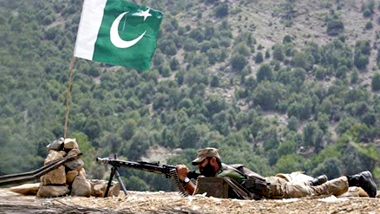 Jammu, Aug 10: Pakistani troops again violated the ceasefire by firing on Indian posts along the LoC in Poonch district of Jammu and Kashmir, four days after five Indian soldiers were killed by specialist troops of the Pakistan Army.
Jammu, Aug 10: Pakistani troops again violated the ceasefire by firing on Indian posts along the LoC in Poonch district of Jammu and Kashmir, four days after five Indian soldiers were killed by specialist troops of the Pakistan Army.
"Pakistani troops resorted to unprovoked firing along LoC in Durga Battalion area in Poonch district around 2220 hours late last night", defence Spokesman SN Acharya said on Saturday.
"Pakistan fired over 7000 rounds of heavy ammunition besides mortar shells on Indian posts during the seven-and-a-half-hour firing in Poonch," defence spokesperson said.
They fired with small arms and automatic weapons on the posts till 2250 hours, he said, adding it was a ceasefire violation.
Army troops gave a calibrated response to the firing, Acharya said, adding that there was no loss of life or damage to property in the firing.
A group of 20 heavily armed men led by Pakistani troops had entered 450 metres into the Indian territory in the Poonch sector in Jammu and Kashmir on August 6 and ambushed a patrol killing five Indian soldiers.
Defence minister AK Antony had blamed the Pakistan Army for the "brutal" act and also warned that last Tuesday's incident will have "consequences" on India's behaviour on the Line of Control and on relations with Pakistan.
"It is now clear that the specialist troops of Pakistan Army were involved in this attack when a group from Pakistan- occupied Kashmir (PoK) side crossed the LoC and killed our brave jawans," he had said.
Taking a hard position, Antony had told Parliament that the "brutal and unprovoked" attack on Indian side of the LoC in Poonch sector "outraged us all" and "naturally, this incident will have consequences on our behaviour on the LoC and for our relations with Pakistan."
Sending out a message to Pakistan, he said, "Our restraint should not be taken for granted; nor should the capacity of our armed forces and resolve of the Government to uphold the sanctity of LoC ever be doubted."
Antony had said, "Those in Pakistan who are responsible for this tragedy and the brutal killing of two soldiers earlier this year should not go unpunished.
"Pakistan should also show determined action to dismantle terrorists networks, organizations and infrastructure and show tangible movement on bringing those responsible for the Mumbai terrorist attack in November 2008 to justice quickly," he had said.





Comments
Add new comment